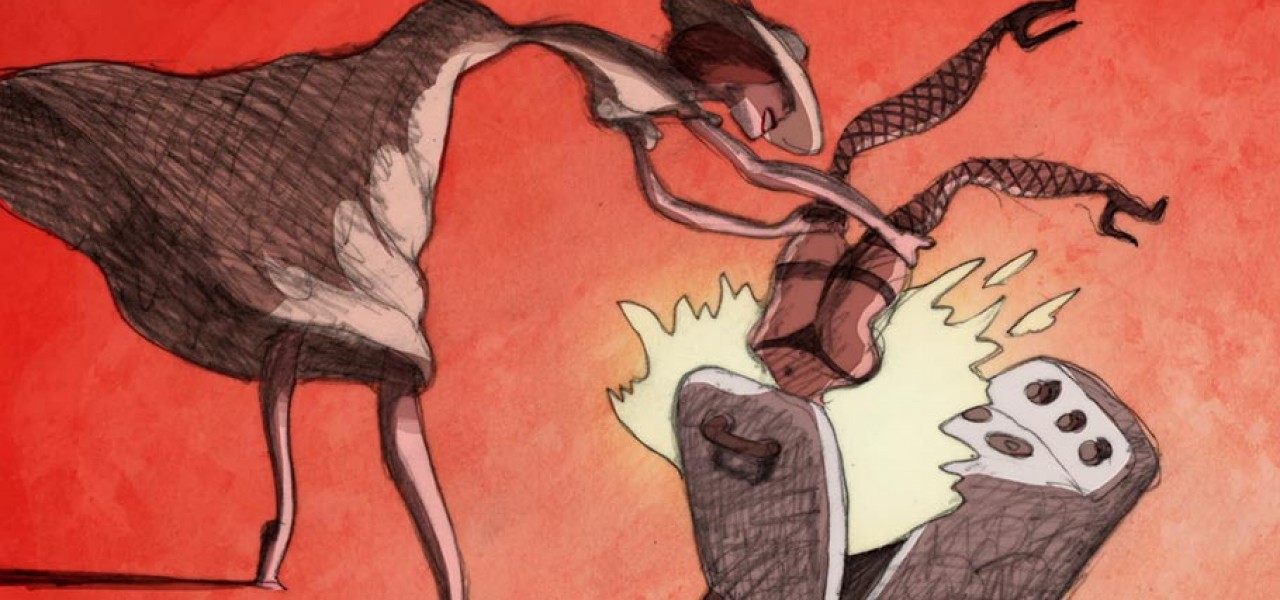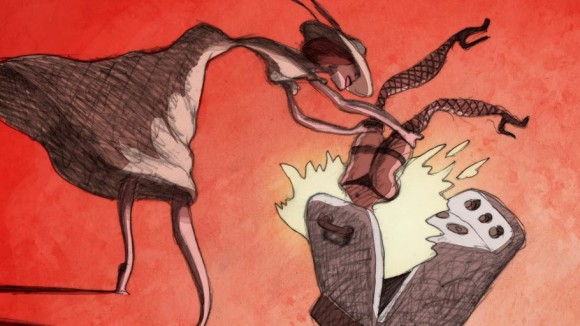

Bill Plympton on ‘Cheatin” and the Challenges of Making Indie Animation for Adults

Although Bill Plympton’s distinctively hand-drawn works have twice been nominated for an Academy Award, this award season the defiantly independent filmmaker has a chance to make animation history.

“If my short film Footprints is nominated and, for some bizarre reason, so is my feature Cheatin’,” Plympton explained to me by phone, “then I will be the first person ever to have been nominated for directing both a feature and a short [in the same year]. Disney never did it, Spielberg hasn’t done it. Miyazaki, Lasseter, no one has ever done it.”
Plympton is particularly enamored with Cheatin’, the tale of exaggerated passion and star-crossed lovers, which he calls the “the best film I’ve ever made.” Cheatin’ is also reportedly the first animated feature film funded on Kickstarter, thanks to loyal Plymptoons fans kicking down the $100,000 needed to finish it. The result is an often hilarious, always operatic fever dream unlike any other animated film in contention for the Academy Award, which includes other hand-drawn efforts like Tomm Moore’s Song of the Sea and Studio Ghibli co-founder Isao Takahata’s perhaps last film, The Tale of Princess Kaguya. And as always, Plympton did every one of the film’s 40,000-plus drawings himself.

As Plympton sees it, landing dual Oscar nominations, much less wins, would go a long way towards legitimizing his quest to bring adult animation back into what he considers a too-conservative marketplace.
“Hollywood executives don’t really care about hand-drawn animation, and don’t really care about animation that’s not for kiddies, so there is very little opportunity for me to make the films that I want to make,” Plympton said.
“Whenever I have a proposal for Hollywood executives, they say, ‘Great, send us a script,'” he explained. “When I tell them that I actually have no dialogue in my films, so there is no script, they say, ‘Well, we have to see a script.’ That tells you they don’t understand visual storytelling, and just want traditional sketches and gags. So I’ve been banging my head against the wall, asking myself why I should do this. All this negative rejection is very frustrating and makes me want to give up the business. But I don’t want to give up the business; I want to continue making my films.”

Plympton’s immediately recognizable, award-winning films stretch across decades, all the way back to his surreal 1987 Oscar-nominated short Your Face and forward through challenging, uproarious and sometimes profane features like I Married a Strange Person, Mutant Aliens, and Idiots and Angels. And his brave, adult-oriented explorations promise to keep on coming: Plympton’s next short Hitler’s Folly is a WWII satire building upon the universally reviled dictator’s real-life love of Walt Disney’s epochal Snow White and the Seven Dwarfs, which Hollywood once derisively called “Disney’s Folly.”
If Plympton thought he had trouble with Hollywood before…
“I know!” he laughed. “It’s actually very controversial; I’ve had a few people refuse to work on the film, so I had to let them go.”
Whether making shorts or features, Plympton wants adults to enjoy his animation, an art form that he says has “no limits, no borders and no rules.” He continued, “My hope is that America is ready for something different, because I think people are starting to get tired of the same old thing from Pixar, Dreamworks and Disney. I think viewers are ready to see hand-drawn animation with its own ideas. Why should kids be the only ones who get pleasure out of animation, when it is such a great art form? It offends me that American animation is stereotyped this way, so I’m hoping Cheatin’ will help break down that wall.”

Even if Plympton’s historic Oscar run doesn’t happen, it’s safe to say he will remain madly in love with Cheatin”s twisted, tortured lines and fluid coloring, a cinematic culmination of his illustration style he has tried to replicate for as long as he has been working.
“When I first became an illustrator in the ’70s, I loved mixing watercolor with pen and ink, but during my whole animation career, I’ve never been able to recreate that style, simply because it was too expensive,” Plympton explained. “But with Cheatin’, we’ve figured how to Photoshop it like watercolor, although it was digitally done by my staff. But that was the reason we ran out of money: The watercolor work was so intensive that we had to hire four extra artists, which blew our budget out of the water. And yet I think it’s the most beautiful style I’ve ever used, and I want to use it again.”
And it wouldn’t have happened without computers, it should be noted. Although Plympton argues that “computer animation is made by machines, which to me doesn’t feel warm and cuddly,” he is the first to admit that digital technology has forever changed his career, for the better.

“In the past, when I was using a big rostrum camera and painting cels like in Hair High, it was expensive and slow,” he explained. “Editing film and mixing sound was extremely expensive; dubbing tracks used to require huge machines to roll each sound effect at the same time. Same with distribution: Lugging and shipping around 35-millimeter canisters and making prints at Technicolor labs got to be expensive too. Over half my budget went toward the film process.”
“But now that it’s digital, I’ve gotten rid of that expense,” he said. “Now I can do it at home on my Mac. For an independent filmmaker, that’s a breath of fresh air. It really is a new era. For that reason, I do applaud digital technology.”

.png)